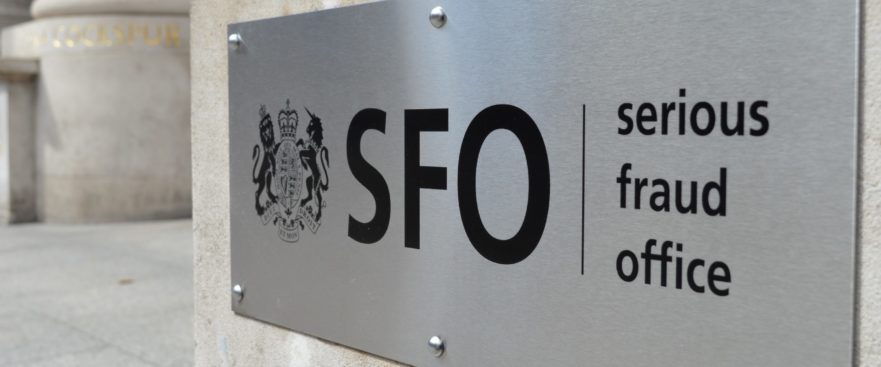
Section 2 notices: What are they? How do they work? What to do if you receive one.
14 Dec 2022
In this blog, Hickman & Rose partner, and financial crime specialist, Emily Sheils sets out the facts about Section 2 notices.
+++++
The first thing anyone who receives a Section 2 notice from the Serious Fraud Office (SFO) should do is remember not to panic.
Section 2 notices are one of the SFO’s most commonly used investigatory tools. The agency issues nearly 50 Section 2 notices in respect of each of its investigations, according to official data (more details on this below).
Receiving a Section 2 notice typically means that the recipient is being treated as a ‘potential witness’. Nonetheless they should take swift action. Section 2 notices should be taken seriously and recipients need to understand how they work to know how best to deal with them.
What are Section 2 powers?
Section 2 powers are special investigatory tools that were given to the SFO at the time of its creation in 1987. They are named after the section of the Criminal Justice Act 1987 which enshrines them.
Once a criminal investigation has been commenced by the SFO, the agency is statutorily entitled to exercise its Section 2 powers on potential witnesses and ‘persons under investigation’ in order to obtain evidence.
The two main Section 2 investigatory powers are:
- The power to compel a person to answer questions in interview or to ‘otherwise furnish information’ (section 2(2));
- The power to compel a person to produce documents (section 2(3)).
In order to exercise either of these powers, the SFO must issue a notice in writing upon the person it wishes to comply.
Section 2 powers are compulsory, which means that either failing to respond or providing misleading information without a ‘reasonable excuse’ are criminal offences. However, statements made in a Section 2 interview cannot be used against the responding individual save for in certain exceptional circumstances. These circumstances are:
- When the individual is prosecuted for making a statement in interview that is false or misleading in a material particular; or
- When the individual is prosecuted for some other offence and when giving evidence makes a statement that is inconsistent with a statement made in their interview.
While this fact may reassure some recipients, this should not lull anyone into a false sense of security as there are still complexities here, about which more below.
According to offical data released under Freedom of Information legislation, over the five years 2015 – 2020, the SFO issued a total of 3,869 Section 2 notices across 83 cases, meaning the agency issued an average of 47 Section 2 notices for each one of its investigations.
Section 2 notices are commonplace, but they are not always straightforward to comply with and often come with risks and issues that require careful consideration.
Can I challenge a Section 2 notice?
Section 2 powers are intrusive. By threatening criminal prosecution for non-compliance, they compel co-operation.
While the SFO should only use these powers when their exercise is necessary for the purposes of the investigation and also both reasonable and proportionate, in reality a recipient’s ability to challenge a notice is limited.
It is possible to write to the SFO to seek to persuade it to change its mind. To stand a chance of success, however, any such written application needs to be deeply considered and prepared in full knowledge of the relevant law.
Beyond writing to the SFO, a recipient can look to challenge a Section 2 notice via judicial review, which is a legal application to a court requesting that it review the SFO’s decision to issue the notice or the terms of the notice itself. Judicial reviews take time and can be expensive. Again, specialist legal advice is needed.
Confidentiality and Legal Professional Privilege
Professional advisors who receive a Section 2 notice (particularly lawyers and people working in financial advice) may well be concerned about the impact on their obligations to preserve information protected by confidentiality and Legal Professional Privilege (LPP).
How, these people may ask themselves, might they be able to adhere to the terms of a Section 2 notice while also maintaining a client’s confidentiality and LPP?
Put simply, Section 2 powers override a duty to keep material or information confidential, but they do not override LPP. This means individuals will be availed of a ‘reasonable excuse’ for either not handing over documentation or answering questions that would otherwise divulge LPP.
Legal Professional Privilege and Section 2 in practice
In practice, the position as to LPP can be complicated and the safeguards that are meant to protect it fallible.
For example, the SFO often expects individuals to make ‘on the spot’ assessments as to LPP in interview, requiring the interviewee to swiftly determine what is LPP information and what is confidential. This is often far harder an exercise than the SFO wish to acknowledge.
In so-called ‘here and now’ production requests – by which the SFO expects material to be delivered immediately – the SFO will employ a ‘blue bag’ system, which involves disclosed material being quarantined until reviewed by an independent LPP counsel who determines the extent to which LPP applies (if at all) to the material.
While clearly well-intentioned, given LPP counsel’s unfamiliarity with the granular detail of the matters under review, this safeguard can result in the inadvertent disclosure of LPP material.
In my experience as a solicitor working in this area, seeking to protect LPP can become a point of contention, which in turn makes the individual and the SFO feel pitted against one another intensifying the stress and anxiety of the process.
Do I have a right to a lawyer in a Section 2 interview?
It is often a shock for individuals to learn that they have no right to legal representation in Section 2 interviews (although the general practice is for at least one lawyer to be allowed to attend).
The SFO’s Operational Guidance, issued in 2016, makes it clear that the attendance of a lawyer in any Section 2 interview is entirely at the case controller’s discretion.
The guidance also stresses that the lawyer’s role should be limited to providing essential assistance by way of legal advice or pastoral support. The lawyer should not to do anything that will “undermine the free flow of information which the interviewee, by law, is required to give”.
In practice, this does not mean that individuals are left to fend for themselves; but there is a lingering threat of lawyers being removed from the interview if, in attempting to properly represent their clients, they are perceived as undermining “the free flow of information”.
Section 2 interviews and going from ‘witness’ to ‘suspect’
Despite the statute allowing the SFO to use its Section 2 powers against ‘persons under investigation’, the SFO tends not to deploy their powers against such individuals.
This is because doing so may create evidential problems for the agency down the line, such as, for example, if a co-defendant seeks to rely upon statements made in another co-defendant’s Section 2 interview, when those statements cannot be used against that individual.
But recipients of Section 2 notices should know that there is a significant ‘grey area’ regarding individuals who are not formal suspects but about whom the SFO nevertheless have suspicions concerning their conduct.
The SFO may well require such individuals to attend a Section 2 interview in their capacity as a ‘potential witness’. If that individual says something self-incriminatory during the interview that triggers the SFO to change their status from ‘witness’ to ‘suspect’, the general practice is for the interview to be paused, the individual to be cautioned, and a new interview to commence, but this time under the auspices of the Police and Criminal Evidence Act 1984 (PACE).
As can be imagined, this may be a difficult and stressful experience for the individual. There are two key things anyone in this situation should know:
- Once the Section 2 interview is terminated and an interview under caution starts the individual becomes statutorily entitled to legal representation at the interview; and
- They are entitled to the right of silence. Even if they are asked about matters that have already been discussed in the Section 2 interview, they can now refuse to answer those same questions.
Section 2 interviews and going from ‘suspect’ to ‘witness’
Conversely, an individual that was previously designated a suspect and interviewed under caution can have their status downgraded to ‘potential witness’ and required to attend a Section 2 interview.
While any individual in this situation is required to cooperate with the Section 2 request, they are not under any legal obligation to voluntarily agree to give a witness statement.
There can be no guarantees, but it is generally the case that giving a witness statement to the SFO increases the chance of that person being called to give evidence at any subsequent trial. This, in turn, opens that individual to the possibility of being cross-examined in court.
This may be a daunting prospect, especially for someone who was previously designated a criminal suspect by the SFO. My advice to anyone in this situation is to think very carefully about the personal risks to them, particularly bearing in mind that the trial will be in public, before agreeing to provide the SFO with a witness statement.
What to do if you receive a Section 2 notice?
Section 2 notices are powerful evidence gathering tools, which compel action on their recipients. They carry risks to individuals caught up in SFO investigations, and can involve significant legal complications.
Given the above, my advice to any recipient of a Section 2 notice is neither to panic, nor be lulled into a false of security.
A Section 2 recipient may have nothing to hide and may want to do all they can to assist the SFO’s investigation. Even so, the process of appropriately engaging with the SFO’s notice is rarely straightforward.
No criminal defence lawyer can predict with certainty how any individual’s Section 2 process will unfold. But an expert in this field will be able to explain the risks and nuances, and thus enable their client to navigate the process in a way that does justice to their version of events while affording them maximum legal protection.



